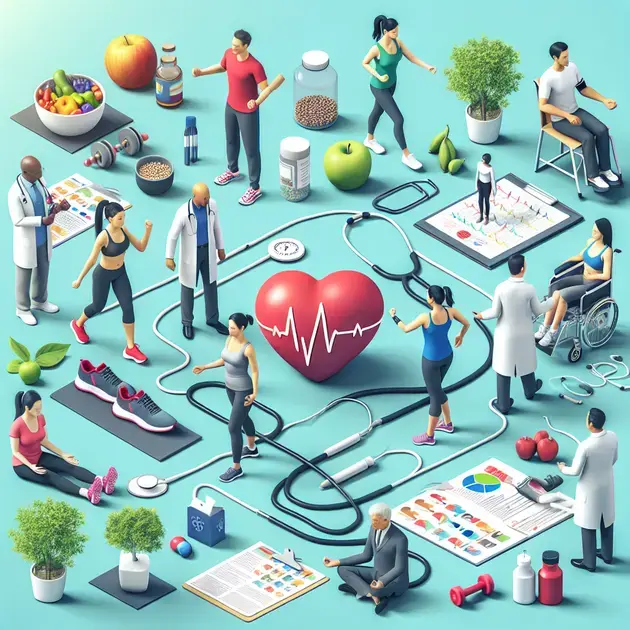High blood pressure, also known as hypertension, is a common condition that affects millions of people worldwide. It can lead to serious health issues if left untreated, making it crucial to understand the causes, symptoms, and treatment options available.
With lifestyle factors such as diet, exercise, and stress playing a significant role in the development of high blood pressure, awareness and education are key in managing this condition effectively. By pinpointing the root causes and recognizing the warning signs early on, individuals can take proactive steps to maintain their cardiovascular health.

Understanding High Blood Pressure
Understanding high blood pressure is crucial for maintaining good health and preventing serious complications. High blood pressure, also known as hypertension, is a condition where the force of the blood against the walls of the arteries is consistently too high. This can lead to heart disease, stroke, and other health issues if left untreated.
A great way to understand high blood pressure is by tracking your blood pressure readings regularly. There are various apps available for both Android and iOS devices that can help you monitor your blood pressure at home. One popular app is “Blood Pressure Monitor” available for download on the App Store and Google Play Store. This app allows you to input your blood pressure readings, track trends over time, and share the data with your healthcare provider.
It’s also important to educate yourself on the causes of high blood pressure. Websites like the American Heart Association provide valuable information on what contributes to high blood pressure and how lifestyle changes can help lower it. By learning more about the condition, you can take proactive steps to manage it effectively.
Additionally, speaking to a healthcare professional can provide you with personalized insights into your high blood pressure. They can explain your readings, discuss potential risk factors, and recommend treatment options tailored to your specific needs.
By taking the time to understand high blood pressure and actively monitoring your levels, you can empower yourself to make informed decisions about your health and well-being.
Identifying Common Causes
Identifying the common causes of high blood pressure is essential for prevention and management. There are several factors that can contribute to the development of hypertension, including genetics, diet, and lifestyle choices. By recognizing these causes, you can take steps to reduce your risk and improve your overall health.
One common cause of high blood pressure is a diet high in sodium. Consuming too much salt can lead to fluid retention and increased blood pressure. To identify sources of hidden sodium in your diet, you can use apps like “MyFitnessPal” that help track your daily food intake and provide insights into your sodium consumption.
Another common cause of hypertension is lack of physical activity. Leading a sedentary lifestyle can contribute to weight gain and elevated blood pressure. To address this cause, consider using fitness apps like “Fitbit” or “Nike Training Club” to establish an exercise routine and track your progress over time.
Stress is also a significant contributor to high blood pressure. Identifying stressors in your life and finding ways to manage them effectively can help lower your blood pressure levels. Mindfulness apps like “Calm” or “Headspace” offer guided meditation and relaxation exercises to reduce stress and promote emotional well-being.
By identifying and addressing the common causes of high blood pressure, you can work towards improving your cardiovascular health and reducing your risk of complications associated with hypertension.
Recognizing Symptoms Early
Recognizing the symptoms of high blood pressure early on is key to seeking timely medical intervention and preventing complications. While high blood pressure is often referred to as a “silent killer” due to its lack of noticeable symptoms, there are certain signs that may indicate elevated blood pressure levels.
One common early symptom of high blood pressure is frequent headaches, especially at the back of the head. These headaches may be persistent and not easily relieved by over-the-counter pain medications. Keeping a headache diary using apps like “Migraine Buddy” can help track patterns and identify if they are related to high blood pressure.
Another symptom to watch out for is visual changes, such as blurred vision or seeing spots. These visual disturbances can occur when blood pressure spikes suddenly and affects the blood vessels in the eyes. If you experience any changes in your vision, it’s essential to consult with an eye care professional or healthcare provider.
Chest pain or tightness can also be a warning sign of high blood pressure. This discomfort may be felt in the chest, arms, shoulders, neck, or jaw and should not be ignored. Using heart rate monitoring apps like “HeartWatch” can help you keep track of any unusual patterns in your heart rate and detect potential issues early on.
Additionally, symptoms like shortness of breath, dizziness, and nosebleeds can sometimes accompany high blood pressure. By recognizing these early signs and seeking medical attention promptly, you can prevent complications and better manage your blood pressure levels.

**Common Risk Factors to Consider**
High Blood Pressure
High blood pressure, also known as hypertension, is a common risk factor that can have serious implications for overall health. It can lead to heart disease, stroke, and other cardiovascular issues if left untreated. Factors such as a diet high in sodium, lack of physical activity, and genetics can contribute to high blood pressure. Monitoring your blood pressure regularly and making lifestyle changes such as eating a balanced diet and exercising regularly can help manage this risk factor.
Smoking
Smoking is another significant risk factor to consider when it comes to overall health. It can increase the risk of developing various diseases, including heart disease, lung cancer, and stroke. Quitting smoking can significantly reduce these risks and improve overall health. Seeking support from healthcare professionals or cessation programs can be beneficial for those looking to quit smoking.
Obesity
Being overweight or obese is a common risk factor that can lead to a range of health issues, including high blood pressure, diabetes, and heart disease. Maintaining a healthy weight through a balanced diet and regular exercise is essential for reducing these risks. Incorporating more fruits and vegetables into your diet, reducing portion sizes, and staying physically active can help manage this risk factor effectively.
Stress
Chronic stress can have a significant impact on overall health and increase the risk of developing various health conditions. Finding effective ways to manage stress, such as practicing mindfulness, engaging in relaxation techniques, and getting regular exercise, can help reduce the impact of stress on the body. Prioritizing self-care and seeking support from mental health professionals can also be beneficial in managing this risk factor.
Poor Diet
A poor diet that is high in processed foods, sugar, and unhealthy fats can contribute to the development of various health problems, including obesity, high blood pressure, and diabetes. Eating a balanced diet rich in fruits, vegetables, whole grains, and lean proteins is essential for maintaining overall health and reducing the risk of chronic diseases. Making small changes to your diet, such as cooking at home more often and limiting fast food intake, can have a positive impact on your health.
**Effective Treatment Methods**
Medication
One of the most common and effective treatment methods for managing high blood pressure is medication. There are various types of medications available, such as ACE inhibitors, beta-blockers, and diuretics, that can help lower blood pressure and reduce the risk of complications. It is essential to work closely with a healthcare provider to determine the most suitable medication and dosage for your individual needs.
Healthy Lifestyle Changes
In addition to medication, making healthy lifestyle changes can also play a significant role in treating high blood pressure. Adopting a balanced diet low in sodium, engaging in regular physical activity, maintaining a healthy weight, and avoiding tobacco and excessive alcohol consumption can all contribute to lowering blood pressure levels. Combining medication with lifestyle changes can lead to more effective treatment outcomes.
Stress Management Techniques
Managing stress effectively is crucial for overall health, especially when it comes to reducing blood pressure levels. Practicing relaxation techniques such as deep breathing exercises, meditation, and yoga can help lower stress levels and promote a sense of calm. Incorporating stress management techniques into your daily routine can complement other treatment methods and enhance overall well-being.
Regular Monitoring
Regular monitoring of blood pressure levels is essential for tracking progress and ensuring that treatment methods are effective. Self-monitoring at home with a reliable blood pressure monitor can help individuals keep track of their blood pressure readings between healthcare visits. Healthcare providers may also recommend regular check-ups to assess progress and make any necessary adjustments to treatment plans.
Complementary Therapies
In addition to traditional treatment methods, some individuals may benefit from complementary therapies such as acupuncture, massage, or herbal supplements. While these therapies should not replace medical treatment, they can be used in conjunction with conventional approaches to enhance overall well-being and support the management of high blood pressure. It is essential to consult with a healthcare provider before incorporating any complementary therapies into your treatment plan.
**Tips for Managing Stress and Blood Pressure**
Regular Exercise
Engaging in regular physical activity is not only beneficial for overall health but can also help reduce stress levels and lower blood pressure. Activities such as walking, jogging, swimming, or yoga can promote relaxation, improve mood, and support cardiovascular health. Aim for at least 30 minutes of moderate exercise most days of the week to experience the stress-reducing benefits.
Healthy Diet
Eating a nutritious diet plays a significant role in managing stress and blood pressure. Consuming a variety of fruits, vegetables, whole grains, and lean proteins can provide essential nutrients that support overall well-being. Limiting processed foods, sugar, and unhealthy fats can help maintain a healthy weight and reduce the risk of high blood pressure and other health issues.
Quality Sleep
Prioritizing quality sleep is essential for managing stress and supporting overall health. Lack of sleep can contribute to increased stress levels and higher blood pressure, so aiming for 7-9 hours of restful sleep each night is important. Creating a bedtime routine, minimizing screen time before bed, and ensuring a comfortable sleep environment can promote better sleep quality.
Stress-Relief Techniques
Practicing stress-relief techniques such as deep breathing, meditation, or progressive muscle relaxation can help lower stress levels and promote relaxation. Taking short breaks throughout the day to practice these techniques can reduce the impact of stress on the body and support overall well-being. Experiment with different stress-relief methods to find what works best for you.
Seeking Support
Managing stress and blood pressure can be challenging, so seeking support from friends, family, or a mental health professional can be beneficial. Talking about your feelings, concerns, and experiences with trusted individuals can help reduce stress and provide valuable support. Additionally, joining support groups or attending counseling sessions can offer additional resources for managing stress effectively.
Conclusion
In conclusion, understanding the common risk factors such as high blood pressure, smoking, obesity, stress, and poor diet is crucial for maintaining overall health. These factors can significantly impact cardiovascular health and increase the risk of various diseases if left unmanaged.
Effective treatment methods, including medication, healthy lifestyle changes, stress management techniques, regular monitoring, and complementary therapies, play a vital role in managing high blood pressure and reducing associated risks. By working closely with healthcare providers and incorporating a holistic approach to treatment, individuals can enhance their well-being and reduce the impact of these risk factors.
Implementing tips for managing stress and blood pressure, such as engaging in regular exercise, maintaining a healthy diet, prioritizing quality sleep, practicing stress-relief techniques, and seeking support from loved ones and professionals, can further support overall health and well-being. By making proactive lifestyle choices and seeking medical guidance, individuals can take control of their health and reduce the risks posed by these common factors.